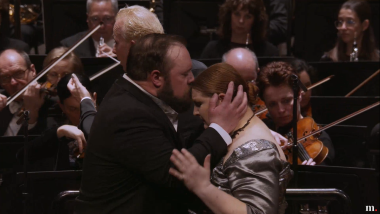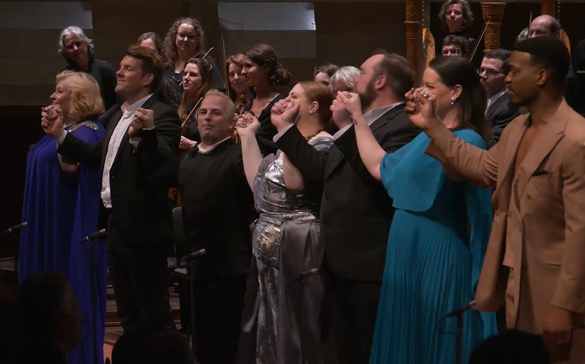 Netherlands Wagner, Die Walküre (concert performance): Soloists, Rotterdam Philharmonic Orchestra / Yannick Nézet-Séguin (conductor). Broadcast live (directed by Lauren Jurrius) on medici.tv from de Doelen (Grand Hall), Rotterdam, 26.4.2024. (JPr)
Netherlands Wagner, Die Walküre (concert performance): Soloists, Rotterdam Philharmonic Orchestra / Yannick Nézet-Séguin (conductor). Broadcast live (directed by Lauren Jurrius) on medici.tv from de Doelen (Grand Hall), Rotterdam, 26.4.2024. (JPr)

Cast:
Siegmund – Stanislas de Barbeyrac
Sieglinde – Elza van den Heever
Hunding – Soloman Howard
Wotan – Brian Mulligan
Brünnhilde – Tamara Wilson
Fricka – Karen Cargill
Ortlinde – Justyna Bluj
Helmwige – Jessica Faselt
Gerhilde – Brittany Olivia Logan
Siegrune – Maria Barakova
Waltraute – Iris van Wijnen
Grimgerde – Ronnita Miller
Rossweisse – Catriona Morison
Schwertleite – Anna Kissjudit
Some things you see and hear can exceed your expectations, in 2022 Yannick Nézet-Séguin, honorary conductor of the Rotterdam Philharmonic Orchestra, led them in a concert performance of Das Rheingold. I have not watched that – though it is still available on medici.tv – but I noted how the cast appeared then to be much ‘starrier’ (with apologies to all concerned) than were now singing in Die Walküre, the second of the four operas of Wagner’s Ring cycle. Here in the first of four performances of a short RPO tour with a visit to Baden-Baden following Rotterdam and with Dortmund and Paris to come (at the time of writing), there was a less-seasoned cast of Wagnerian singers with several making full role debuts in Die Walküre (Stanislas de Barbeyrac, Elza van den Heever and Tamara Wilson, I believe) and others who have not sung their roles that often (Brian Mulligan, Soloman Howard and even the otherwise vastly-experience Karen Cargill). I also suspect this was the first performance when Nézet-Séguin conducted the entire opera.
Die Walküre is where humans enter Wagner’s great tetralogy after the god-centric Das Rheingold and Wotan’s best laid plans begin to unravel. With a storm raging, Sieglinde, victim of a loveless marriage to Hunding, shelters a wounded stranger. They soon accept their attraction to each other. He is Siegmund, the twin from whom Sieglinde was separated in childhood and – unbeknownst to them – their father is Wotan, the chief god. Through Siegmund, he hopes to win back the all-powerful ring he gave away in Rheingold because he cannot reclaim it himself. Brother and sister escape from Hunding, taking with them Nothung, a sword Wotan had predestined for Siegmund. Unfortunately, Wotan’s wife Fricka is goddess of marriage and she angrily demands he must not protect his incestuous children just to serve his ends, and Wotan resentfully concedes. However, Brünnhilde, one of Wotan’s nine Valkyrie daughters, is determined to save Siegmund because that is what she believes her father truly wants. Wotan prevents that by shattering Siegmund’s sword, and he is killed fighting Hunding. Brünnhilde does rescue Sieglinde, who she reveals is pregnant with Siegmund’s son, Siegfried. He can be the hero Wotan needs to bring his plans to fruition. As punishment for defying him, Wotan condemns Brünnhilde to sleep on a mountaintop protected by magic fire which will put off all but the very bravest who they hope will be Siegfried.
So, there is a lot happening in Die Walküre and it certainly – like most Wagner operas – does not lend itself to a concert performance, particularly where there is no real sense of a ‘staging’ or any video projections, no props and the conspicuous use of music stands and scores. That it worked so well was due to the talented singers – a veritable United Nations – the Metropolitan Opera’s music director, the very smiley Yannick Nézet-Séguin, had gathered for this performance, as well as his own conducting of the orchestra. Nézet-Séguin’s Wagner was never bombastic; Wagner’s changes of dynamics seemed scrupulously observed, there were intimate moments though the conductor never held back when the score demanded it. This Die Walküre – as heard through loudspeakers – was highly dramatic with many moments of great beauty. Throughout the Rotterdam Philharmonic played with considerable radiance and virtuosity which led to many notable individual moments, especially from cello, trumpet, bass clarinet, and cor anglais.
I have written before how in 1984 Reginald Goodall, then 83 and in his twilight years, conducted Die Walküre in Cardiff and how it was a revelation. He had been renowned for his expansiveness (okay slowness!), but now it was viscerally exciting, emotionally gripping …and surprisingly swift. Nézet-Séguin’s Die Walküre sounded a little like that memorable performance, though after a carefully-paced Act I in the end it lasted – a fairly standard – 3¾ hours.

There was no apparent coordination in what the singers were wearing, there were some dark suits and blue gowns, but Soloman Howard (Hunding) forgot the shirt for his fawn three-piece and best of all Tamara Wilson was the epitome of Brünnhilde in her sparkly, silver-grey haute couture. Some acted less than others depending on their familiarity with what they were singing. Never for a moment did I miss a set or a Konzept because the theatrical impact of the opera was never compromised, even though singers often sang to each other from opposite ends of the platform. When Brian Mulligan’s Wotan tenderly kissed the forehead of Tamara Wilson’s Brünnhilde as he bid her a sad farewell, it was as heartrending as I have ever seen it. Kudos to Wilson for staying onstage when she had finished singing which isn’t always the case in a concert performance.
Stanislas de Barbeyrac was an impressive Siegmund and ‘Ein Schwert verhiess mir der Vater’ and ‘Winterstürme wichen dem Wonnemmond’ showed how possible it is to sing the big Wagner roles lyrically and with considerable nuance. His timbre is distinctly German and not French and the ‘Wälse! Wälse!’ exclamations were wholehearted and a triumph of excellent breath control.
Elza van den Heever’s Sieglinde was as theatrically intense as a concert performance allows and vocally resplendent throughout. A highlight of her singing – amongst many – was its culmination and a most rapturous ‘O hehrstes Wunder!’. Soloman Howard was the one vocal disappointment for me and whilst he oozed menace, his cavernous tones lacked focus and there was a rather indistinct use of the German language.
Brian Mulligan proved a consummate storyteller when Wotan in Act II recounted the story of the Ring so far. His was a less world-weary account than is sometimes heard and despite all the familiar anger and bravado as Wotan rails against all his misfortune, it sounded fresher – and certainly more engrossing – than I have sometimes heard it before. This Wotan clearly came off second-best in his encounter with an imperious, vengeful and bitter Fricka; Karen Cargill berated her errant husband fearsomely right up to her last emphatic consonant. Unfortunately, there was the impression Mulligan was running on empty (vocally) during his closing lines of the Magic Fire Music (with magic indeed from the six harps), but he is not the first to struggle then and it should not detract from how good he otherwise was.
Even more impressive was Tamara Wilson’s Brünnhilde: hers was a rich voice, with an innate beauty, even throughout its range and she is another singer with impressive breath control. Her ‘Hojotohos’ might possibly have been equalled but rarely bettered. Dramatically she was a very creditable strong-willed teenager onstage and Wilson’s performance was most subtly characterised, moving from devoted daughter to a defiant – though broken and genuinely tearful – figure at the end.
I remember many wonderful octets of Valkyries in the past though few who ever relished all their ‘Hojotoho’-ing as much as those singing here did. Without a weaker voice amongst the eight of them, their singing was in almost perfect harmony during a rousing Walkürenritt. The whole evening had so many memorable moments and the members of the audience standing to applaud the end of each act, as well as all concerned at the end of what was over five hours for them in the concert hall, showed how much they had thoroughly enjoyed it all.
Jim Pritchard
Featured image: Yannick Nézet-Séguin and the principal singers of Die Walküre © medici.tv
